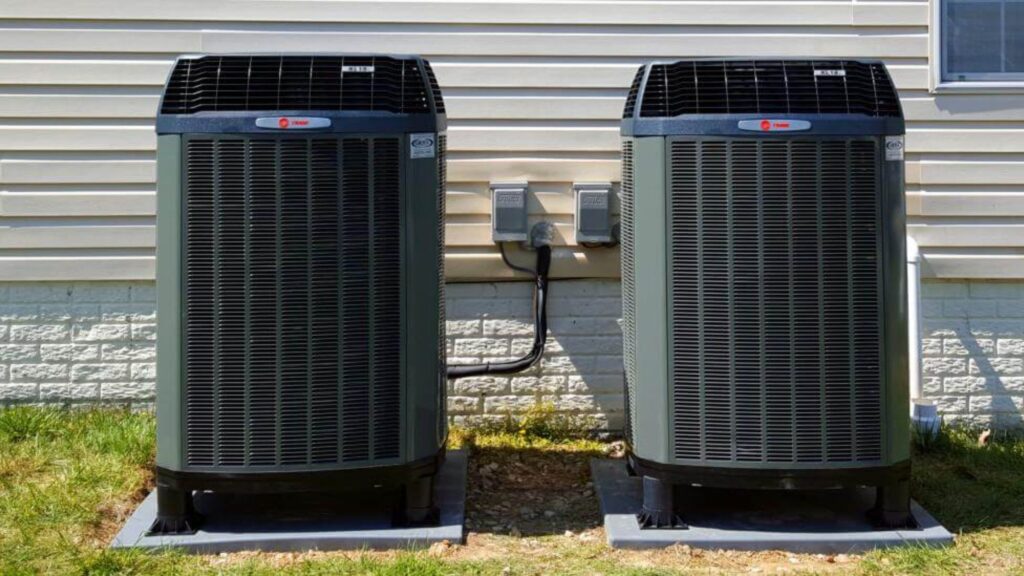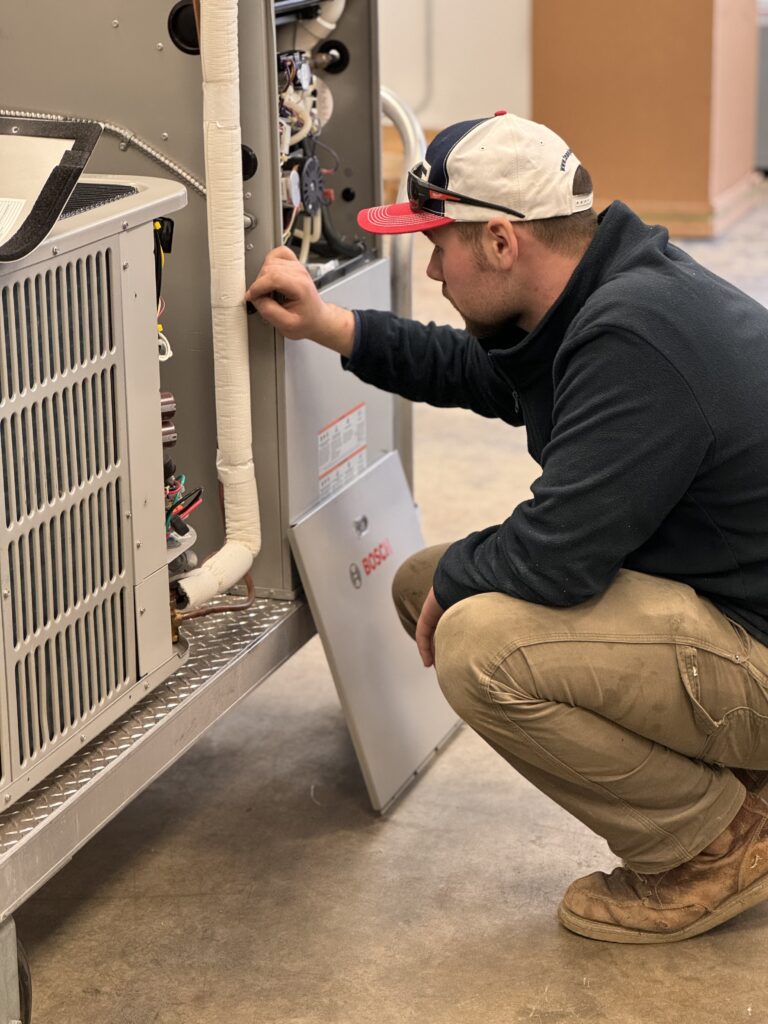Massachusetts winters can be harsh, with temperatures regularly dipping below freezing. As energy efficiency becomes a rapidly growing concern for homeowners, many are considering heat pumps as an alternative to traditional heating systems. Most heating services in Massachusetts suggest you have an energy-efficient heat pump. These pumps consume less energy while keeping the space cozy for a long time.
But how does a heat pump work, and is it a good option for the cold winter months in Massachusetts? Let’s break it down.
Table of Contents
ToggleHow Does a Heat Pump Work?
A heat pump is an energy-efficient heating system that transfers heat rather than generates it. Using a refrigeration cycle, it extracts heat from the outside air and brings it indoors. This process might seem counterintuitive in cold climates, but modern heat pumps are specifically designed to work in sub-zero temperatures, making them a great option for Massachusetts winters.
During winter, the heat pump pulls in outside air, even when it’s cold, and extracts the heat. That heat is then compressed, raising its temperature significantly, and is transferred into your home. This cycle repeats to keep your house warm and comfortable. A heat pump is also beneficial for cooling in the summer months, offering year-round comfort with just one system.
Process to Install Pumps By Heating Services in Massachusetts
A proper heat pump installation is a multi-step process that needs precision to ensure optimal performance, especially in colder climates like Massachusetts.
1. System Type
The most common type of heat pump is an air-source pump, which extracts heat from the air outside and transfers it indoors. The mini-split heat pump cost is a bit higher, but it doesn’t require ductwork and is easy to install, making it a great option for homes without existing duct systems.
2. Installation Steps
- Outdoor Unit: The first step is installing the outdoor unit, which absorbs heat from the outside air. This unit should be placed in a location that is not obstructed by snow or ice.
- Indoor Unit: The indoor unit, or a pum, or air handler, is installed inside the home. This is where the heat is transferred into the indoor air to warm the home.
- Refrigerant Lines: The indoor and outdoor units or pumps are connected through refrigerant lines, which carry the heated refrigerant between the two units.
3. Heating Process
In winter, the outdoor unit absorbs heat from the outside air. The refrigerant inside the unit absorbs this low-grade heat and carries it to the compressor. The system’s compressor increases the temperature of the refrigerant and pumps it into the indoor unit, where it is released into the home. This process repeats, ensuring continuous warmth as long as the system is running.
Is a Heat Pump Good for Massachusetts Winters?
Massachusetts winters can be tough, with temperatures often dropping well below freezing. The question many homeowners have is: Will a heat pump be able to keep up? The answer is yes, but it depends on the system you choose.
- Efficiency in Cold Weather: Modern cold-climate heat pumps are designed specifically to operate seamlessly in temperatures as low as -15°F. Unlike traditional heat pumps, which struggle in colder temperatures, these advanced models use new technology like specialized compressors and refrigerants to ensure reliable operation in sub-zero weather.
- Energy Efficiency: Heat pumps are incredibly energy-efficient, often delivering up to 3 times more heating energy than the electricity they consume. This is due to the fact that heat pumps do not generate heat; rather, they transfer it, which requires less energy. During the coldest months of winter, this can result in avoiding emergency heating problems and saving big on your energy bills.
- Reduced Operating Costs: Heat pumps can drastically lower operating costs compared to traditional heating systems like oil or propane. In addition, as the price of fossil fuels continues to rise, heat pumps provide a stable and cost-effective alternative, especially for homeowners looking to reduce their heating expenses.
- Year-Round Comfort: Heat pumps aren’t just for winter. They also act as air conditioners during the summer months. This double-faceted functionality means that you can invest in one system that provides comfort year-round, making it a smart choice for Massachusetts homeowners who want to maximize the value of their heating and cooling systems.
- Environmental Benefits: One benefit of heat pumps is their eco-friendly nature. By using electricity instead of other sources like fossil fuels, heat pumps produce lesser greenhouse gas emissions, helping to reduce your home’s carbon footprint. This makes them the perfect option for environmentally conscious homeowners who are looking for sustainable alternatives to traditional heating systems.
- Tax Benefits: Good news for homeowners in Massachusetts: installing a heat pump may make you eligible for federal tax credits. Under the U.S. government’s energy efficiency programs, homeowners can receive tax credits for installing green or energy-efficient heating systems like heat pumps. Be sure to check with your installer to see if you qualify for any available rebates or credits.
Do Heat Pumps Require Backup Systems?
While modern cold-climate heat pumps are highly effective even in sub-zero temperatures, extremely cold conditions (such as those below -13°F) may require a backup heating system. Some homes in Massachusetts may experience sustained periods of frigid weather, and in those cases, a backup heating system like an electric resistance heater or a furnace may be necessary to ensure that your home stays warm.
However, for most Massachusetts homes, especially those in cities like Worcester, Springfield, and Boston, a properly installed heat pump will be able to handle winter temperatures without needing a backup system. It’s important to work with experienced emergency heating services who can assess your home’s specific heating needs and recommend the right system.
Final Thoughts
Professional heating services in Massachusetts can install a pump, which is an energy-efficient, eco-friendly, and reliable heating system for the winter months. With the right installation, modern cold-climate heat pumps can keep your home warm even during the coldest parts of winter, all while offering significant savings on energy costs.
Ready to make the switch to an energy-efficient heating system? Endless Energy offers professional heat pump installations and energy-efficient systems to keep your home warm during the Massachusetts winters. Contact us at (508) 474-7147 or book online to get a quote and learn more about how our heating services can save you money.
(FAQs) Frequently Asked Questions
How long does a normal heat pump last?
A heat pump usually lasts around 15-20 years with proper maintenance. Regular servicing and cleaning can extend its life, making sure that it operates efficiently for many years, helping you save on energy costs.
Do heat pumps work in extreme cold?
Yes, modern cold-climate heat pumps are made to operate productively in temperatures as low as -15°F. Most of them are equipped with advanced technology that helps them extract heat from the air, even in freezing weather.
What is the average cost of installing a heat pump?
The average charges for installing a heat pump vary based on the size of your home and the system type. Simply, installation can range from $3,000 to $8,000, but it can save you a lot of money on energy bills in the long run.
Can I install a heat pump without ductwork?
Yes, you can. Ductless mini-split heat pumps are the best option for homes without existing ductwork. They are easy to install and provide both heating and cooling without the need for extensive remodeling.
Will a heat pump save me money on my energy bills?
Yes, heat pumps are highly energy-efficient. They can provide up to three times more heating energy than the electricity they consume. This efficiency leads to lower energy bills compared to traditional heating systems like oil or propane.






